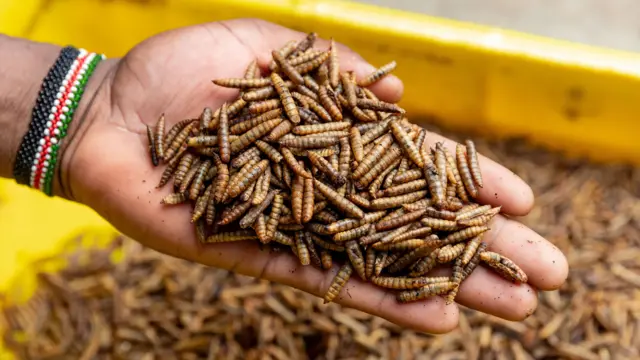The idea of letting flies devour your leftover food waste may sound revolting — but in Vilnius, Lithuania, it’s already part of the city’s official waste policy. The city’s forward-thinking partnership with insect-processing company Energesman is turning maggots into municipal heroes. And the question now is: should other cities follow?
From Trash to Treasure with Fly Larvae
Fly larvae, or maggots, are nature’s cleanup crew — capable of consuming over 11 tonnes of food waste in mere days. Energesman, based in Vilnius, manages more than six million flies in its facilities, with plans to process 12,000 tonnes of food waste by 2026. This initiative is expected to save the city €2 million annually food waste.
The process is surprisingly efficient. Female flies lay up to 500 eggs during their 21-day lifespan. These larvae are collected before maturing into adult flies, then converted into protein-rich materials for industrial use. Their waste, called “frass,” makes excellent organic fertilizer.
Fly larvae aren’t just a waste solution. Energesman is exploring their potential in various industries, including producing ingredients for glue, furniture, paint, and even lampshades. Trials are ongoing, and while some results — like the incorrect paint color — have been mixed, enthusiasm remains high.
Flies as Feed, Not Food
Despite their promise, fly larvae fed on household waste cannot currently be used in edible insect products due to EU and UK health regulations that guard against contamination from meat and fish scraps. However, larvae remain in demand for animal feed, university research, and as fishing bait.
Could This Work in the UK?
In the UK, millions of tonnes of food waste are produced annually. Yet, current laws from DEFRA (Department for Environment, Food and Rural Affairs) prevent councils from using fly larvae to manage household food waste. Instead, most waste is directed to anaerobic digestion plants — facilities that are struggling to scale up in time for new collection mandates by 2026.
According to Flybox co-founder Larry Kotch, the potential for insect waste management in the UK is massive. His company, which operates more fly-based recycling units than any other in Britain, is optimistic. “Up to 40% of global food waste could be upcycled using insect waste management,” he says.
Kotch believes UK councils are ready to adopt fly-based technology — if regulations catch up. “Everyone we’ve spoken to in UK councils is very excited about insect protein,” he says. “They’d much rather work with insect farms than outdated methods.”
International Buzz Around Bug-Based Recycling
Vilnius isn’t alone. In Kenya, Project Mila is using fly larvae to manage Mombasa’s food waste crisis while supplying local farmers with frass fertilizer. Australia’s Goterra is helping Sydney and regional councils trial fly-based processing solutions. But municipal adoption remains limited.
The barriers? Mainly regulation. “Government is always more comfortable saying no,” Kotch notes. But as cities look to cut costs, curb methane emissions, and meet sustainability goals, they may have no choice but to embrace these creepy-crawly allies.
A Global Food Waste Crisis
Each year, over 1.3 billion tonnes of food is wasted worldwide. Much of it ends up in landfills, emitting methane — a potent greenhouse gas. Insect-based solutions provide not only a low-cost alternative but a circular economy model that generates protein, fertilizer, and even raw materials for industries.
With the UK planning mandatory weekly food waste collections from March 2026 — and 148 out of 317 local councils still unprepared — experts warn that the country must urgently explore alternatives like insect bioconversion.
The Verdict: Should We Let Flies Eat Our Food Waste?
Absolutely — as long as it’s done safely and sustainably. Insect-based waste management is proving to be effective, scalable, and economical. Cities like Vilnius are already leading the way, and early adopters in Kenya and Australia show that it’s more than just a niche experiment.
With regulatory reform and public education, flies could be our unlikely allies in building a cleaner, greener future.
Related: How Kenyan Farmers Are Using Fly Larvae to Beat Food Waste


